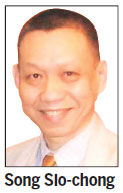Hong Kong still has to address issue of patriotism
Updated: 2014-08-18 07:00
By Song Sio-Chong(HK Edition)
|
|||||||
Three decades have passed since the architect of "One Country, Two Systems", late paramount leader Deng Xiaoping, clearly stated that people implementing the principle of "Hong Kong people governing Hong Kong" had to be "patriots". Unfortunately, Hong Kong is still arguing whether patriotism should be required of its future leaders. This issue needs to be resolved.
Patriotism may mean different things to different people in different situations during different eras and under different ideologies. But it only means one thing, and one only, in regard to the implementation of the "One Country Two Systems" principle in Hong Kong. It means being loyal to one's country as a Chinese citizen. This point was recently re-emphasized in the central government's white paper.
People who are residents - either permanent or non-permanent - but not Chinese citizens, are not required to love a country they do not belong to. Unlike other countries and regions, the magnanimity of "One Country Two Systems" does not prevent those who are not Chinese citizens from becoming lawmakers and judges in the SAR, even if they are not required to love the country.
According to Article 67 of the Basic Law, the proportion of these lawmakers should not exceed more than 20 percent of all Legislative Council members. Article 90(1) of the Basic Law says justices and judges, except the Chief Justice of the Court of Final Appeal and the Chief Judge of the High Court, can be non-Chinese citizens. The chief justice and chief judge are required to swear to uphold the Basic Law and swear allegiance to the SAR (Article 104), but not necessarily to the country.

However, all those who administer Hong Kong, including the Chief Executive, principal officials, executive councilors, members of the Legislative Council, and the judiciary should be loyal to both the country and Hong Kong. They are not only permanent residents of HKSAR, but also citizens of the People's Republic of China (PRC) as stipulated in various provisions of the Basic Law.
Relevant provisions of the Constitution of the PRC state that citizens have the duty to safeguard the unity of the country, as well as the security, honor, and the interests of China. They must also abide by the Constitution and the laws.
The white paper said, "Both the Constitution and the Basic Law provide for the establishment of the HKSAR, which works for China's national unification, territorial integrity and maintaining Hong Kong's long-term stability and prosperity."
This means public figures should be loyal to both the Constitution and the Basic Law and to both the PRC and the HKSAR.
It goes without saying that Hong Kong should be governed by local people who are patriots. This is well-grounded in the Constitution and the Basic Law.
In the United States, Americans have to swear allegiance to the US constitution when they acquire citizenship. There is no such requirement in the PRC for Chinese citizens. But there is no reason why Hong Kong politicians who are Chinese should not be required to swear allegiance to the Constitution and the country before they take office. If this is not unreasonable, then why shouldn't this also be required of people who run for the office of Chief Executive, the most important position in the SAR?
I believe the best way to resolve this is to address the issue in the Chief Executive Election Ordinance directly. I hope the Standing Committee of the National People's Congress can make this clear very soon.
Some may argue that to love the country also implies to love the Communist Party, and because of this swearing allegiance to the Constitution and the country should not be required. But these people should remember that Hong Kong is practicing capitalism under "One Country Two Systems".
Now while loyalty to the Communist Party of China (CPC) may also imply loyalty to the country, loyalty to the country does not necessarily imply any allegiance to the CPC. In China today, only 6 percent of people are CPC members. Now these people are required to be loyal to both the party and the country. But not all Chinese are legally required to be loyal to the party.
Only a small fraction of provisions in the Constitution concerns socialism on the mainland and most of these do not emphasize any ideology. As to loyalty to the country, it should also be regarded as being free of any ideology - irrespective of whether the country practices socialism, capitalism, feudalism - even slavery. The southern part of the US, for example, still practiced slavery before the civil war broke out, but all Americans in both the North and the South still had to swear allegiance to the constitution. In other countries too, people's patriotism always came before ideology. I believe the Chinese are no exception in this regard.
The author is a HK veteran commentator and professor at the Research Center of Hong Kong and Macao Basic Law, Shenzhen University.
(HK Edition 08/18/2014 page9)